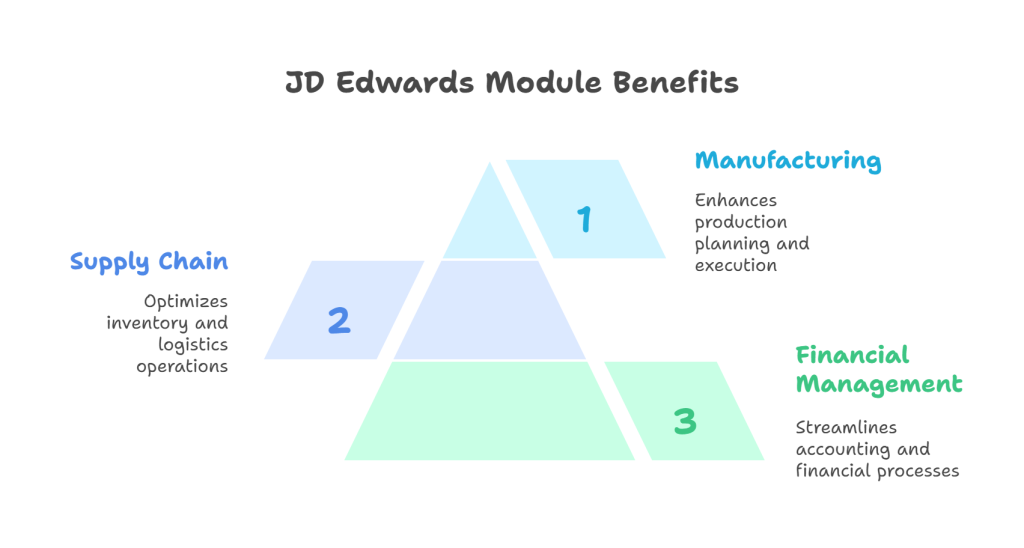Are disparate systems holding your business back from reaching its full potential? In today’s dynamic business landscape, achieving operational efficiency, maintaining stringent financial control, and gaining real-time data visibility are no longer luxuries – they are necessities.
For countless organizations worldwide, Enterprise Resource Planning (ERP) systems like JD Edwards Enterprise One from Oracle serve as the backbone for managing complex operations. A robust and integrated ERP solution, JD Edwards EnterpriseOne offers a comprehensive suite of applications designed to streamline processes across various departments.

While JD Edwards boasts a vast array of modules, each tailored to specific business functions, this article will focus on the top three modules – Financial Management, Supply Chain Management, and Manufacturing Management – that consistently deliver significant and measurable benefits to businesses, enabling them to thrive in a competitive environment.
Understanding the Power of JD Edwards Enterprise One
At its core, JD Edwards EnterpriseOne is an integrated suite of business applications that helps organizations manage their entire operations, from financials and projects to manufacturing and supply chain. Its primary strength lies in its modular design.
This inherent flexibility allows businesses to implement only the functionalities they need, tailoring the system to their unique requirements while providing the option to expand and integrate additional modules as their business evolves.
The general benefits of a well-implemented ERP system are profound, including improved data accuracy, streamlined processes, reduced manual errors, and ultimately, enhanced decision-making capabilities driven by a single source of truth.
Module 1: Financial Management – The Cornerstone of Fiscal Health
For any business, sound financial management is not just important; it’s existential. The JD Edwards Enterprise One Financial Management module is the bedrock upon which fiscal health is built, providing robust tools for meticulous accounting and insightful financial reporting.
Its key features and functions are designed to give businesses unparalleled control over their money matters. The integrated General Ledger, Accounts Payable (AP), and Accounts Receivable (AR) functionalities, for instance, are pivotal.
Through automated AP/AR processes, businesses can significantly reduce manual errors, accelerate invoice processing, and improve cash flow by ensuring timely payments and collections. Imagine the efficiency gained when supplier invoices are processed automatically and customer payments are accurately reconciled without manual intervention.
The module also excels in Fixed Asset Accounting, allowing businesses to meticulously track asset depreciation, manage asset lifecycles, and optimize their utilization for better financial reporting and tax compliance.
Furthermore, robust Expense Management and Budgeting capabilities provide real-time visibility into expenditures, enabling organizations to adhere strictly to budget constraints and identify areas for cost optimization.
For businesses operating across borders, JD Edwards Financial Management’s Multi-currency and Multi-company Capabilities are indispensable, simplifying complex international financial transactions and consolidating data from disparate entities.
The business benefits derived from implementing this module are clear: enhanced financial control, accurate and timely reporting, seamless regulatory compliance, and empowered decision-making based on real-time, precise fiscal data.
This leads directly to a healthier bottom line and a more secure financial future.
Module 2: Supply Chain Management – Optimizing Operations from End to End
In today’s globalized marketplace, an efficient supply chain is a competitive differentiator. The JD Edwards Enterprise One Supply Chain Management module is crucial for businesses aiming to optimize their entire operational flow, from procurement to customer delivery, ultimately leading to enhanced customer satisfaction.
This module offers a comprehensive suite of features. Its Inventory Management capabilities are vital for maintaining optimal stock levels, significantly reducing holding costs, and preventing costly stockouts that can cripple production or sales.
Businesses can gain insights into demand patterns and automatically trigger reorder points, ensuring products are available when needed. The module also streamlines Procurement and Supplier Relationship Management, allowing for the automation of requisitions, purchase orders, and approvals. This not only speeds up the purchasing process but also fosters strategic supplier relationships through better contract management and performance tracking.
For instance, you can track supplier reliability and pricing trends, leading to more informed purchasing decisions. Order Management and Fulfillment tools within the module drastically improve order accuracy and ensure on-time delivery, critical factors for customer loyalty.
From order entry to shipping, every step is meticulously tracked. Lastly, comprehensive Logistics and Warehousing functionalities ensure the efficient movement and storage of goods, optimizing warehouse layouts, tracking goods in transit, and managing freight costs.
The result for businesses is a tangible reduction in operational costs, vastly improved supply chain visibility from raw materials to finished goods, faster order fulfillment times, and, critically, enhanced customer satisfaction through reliable product availability and delivery.
Module 3: Manufacturing Management – Driving Production Excellence
For any organization involved in the production of goods, the JD Edwards Enterprise One Manufacturing Management module is indispensable. It empowers businesses to achieve production excellence by optimizing every stage of the manufacturing process.
The module provides robust Production Planning and Scheduling tools, allowing businesses to create optimized production schedules that meet demand forecasts while minimizing downtime and maximizing resource utilization.
This can involve intricate planning based on machine availability and labor capacity. Its Material Requirements Planning (MRP) functionality is a game-changer, ensuring that all necessary materials are available precisely when needed, thereby preventing costly production delays due to material shortages. Imagine a scenario where raw material deliveries are perfectly synchronized with production schedules.
Shop Floor Control provides real-time tracking of production activities, enabling supervisors to monitor work orders, track progress, and identify bottlenecks on the shop floor as they happen.
Finally, comprehensive Quality Management features help businesses maintain high product quality, minimize rework, and reduce scrap by enforcing quality checks at various stages of production. This ensures that only products meeting stringent standards reach the customer.
The business benefits of leveraging this module are substantial: significantly increased production efficiency, a marked reduction in waste and scrap, improved product quality, and better utilization of all manufacturing resources, leading to higher output and lower operational costs.
Why These Three Modules Stand Out Together
While each of these JD Edwards Enterprise One modules offers substantial individual benefits, their true power is unleashed when they are implemented and utilized together. There’s a natural interconnectedness and synergy between Financial Management, Supply Chain Management, and Manufacturing Management.
Financial data from manufacturing operations flows seamlessly into the general ledger, supply chain costs impact profitability, and production plans are dictated by sales orders and inventory levels. This integration creates a holistic business view, providing decision-makers with a comprehensive, real-time overview of their organization’s performance across critical functions.
By eliminating data silos and fostering seamless information exchange, businesses can react quicker to market changes, identify trends, and make more informed strategic decisions. Ultimately, investing in these core modules provides the quickest and most significant return on investment (ROI) for most businesses, laying a strong foundation for sustainable growth and operational excellence.
Final Thoughts
In conclusion, while the JD Edwards Enterprise One suite is vast and versatile, the Financial Management, Supply Chain Management, and Manufacturing Management modules stand out as foundational pillars for any business striving for operational excellence and sustainable growth.
These JDE modules are not merely standalone applications; they are interconnected systems designed to streamline operations, reduce costs, enhance data visibility, and empower better decision-making.
From ensuring robust financial control and accurate reporting to optimizing the entire supply chain and driving efficient manufacturing processes, these three modules collectively deliver profound ERP benefits that are critical in today’s competitive landscape.
By leveraging their integrated capabilities, businesses can achieve unparalleled efficiency, foster greater accountability, and unlock their full potential.
Ready to unlock the full potential of JD Edwards for your business? Contact a certified JD Edwards expert or Oracle partner today to discuss how these essential modules can be tailored to your specific needs and propel your organization forward.


